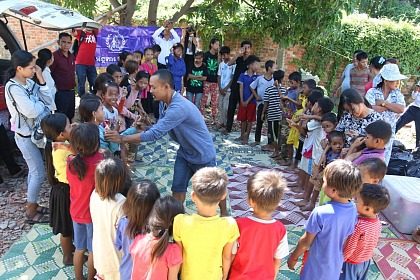On World Day Against Child Labour, LICADHO calls for the government to enforce existing child labour laws
Published on 12 June 2019Today, LICADHO marked World Day Against Child Labour by organising community events in two brick factories in Kandal province: Tboung Pich in Mukh Kampul district and Kheng Hok in Ksach Kandal district. Around 200 people attended the events, including brick factory owners, workers, and children. The events sought to raise awareness in the brick production sector about the criminality and consequences of employing child labour and debt bondage, and the importance of prioritising workplace safety.
The events were organised at the two brick factories to ensure that both factory owners and their employees were brought together to have a better understanding of the risks of employing child labour and the use of debt-bonded labour. Presentations were made and leaflets were handed out to the owners and workers about the legal provisions in the Labour Law and Cambodia’s commitments to the International Labour Organisation’s Convention 182 to stop the worst forms of child labour.
LICADHO believes engaging with all interested parties – brick factory owners, the government, workers and their children – is an effective way to raise awareness of the debt-bonded labour and underage workers that are often seen in Cambodia's brick factories. It is incumbent on the Cambodian government to enforce all existing legal provisions to immediately stop child labour at brick factories and ensure not a single child is ever injured at these factories.
Recently in March 2019, a ten-year-old girl lost her right arm at a brick factory in Cambodia. Despite being a minor, the girl was putting mud into brick-making machinery to help her parents, who were paid by the piece. This payment scheme, a common feature of brick factories along with debts owed by workers to brick factory owners, provide incentives for families to increase output by utilising all family members in the labour process.
Immediately after this incident, the Ministry of Labour and Vocational Training punished and fined the factory owner and shut down the factory. However, as of 30 May 2019, LICADHO has observed that the factory is still in operation, though with lower production output. Law enforcement and relevant authorities have an obligation to take further and more effective steps at ending child labour and debt bondage in brick factories.
In a 2016 report titled ‘Built on Slavery: Debt Bondage and Child Labour in Cambodia’s Brick Factories’, LICADHO monitored 11 brick production facilities centered around the main production area of northern Phnom Penh, containing over 100 factories and thousands of workers. It detailed how factory owners recruit workers, provide loans and offer housing on the understanding that labourers will work until they repay their debts. Low pay means workers often struggle to pay back the loans and make their children work to increase production and incomes. The report also documented three cases of children who lost arms in brick factory machinery, one of them dying as a result of their injuries.
Despite existing legal provisions and years of highlighting this issue, the pervasiveness of child labour at brick factories illustrates that relevant authorities are not taking appropriate steps to end child labour and debt bondage in brick factories. In the 2016 report, LICADHO issued a number of recommendations to the Cambodian government to enforce the laws on bonded labour and to eliminate all forms of debt bondage. Sufficient resources and funding must be provided to the authorities to monitor and investigate cases of child labour and enforce appropriate penalties against perpetrators, as stated in the Labour Law and related government notifications. At the same time, the government and factory owners must be held accountable for any failure to stop any and all forms of child labour.
On 5 June 2019, Labour Ministry issued a notification containing five measures banning children from entering the production line in brick factories. This included developing warning signs, prohibition on the use of debt bondage, regular monitoring of the production line, keeping workers’ accommodation away from the production line and absolute prohibition on all forms of child labour exploitation.
More important than issuing directives, the government must ensure enforcement of legal measures, including routine and stringent inspections, consistent engagement with brick kiln owners, and education of workers about the risks and criminal nature of child labour and debt bondage. These and other recommendations have already been listed in LICADHO’s 2016 report.
LICADHO reiterates its call that there should be no child labour in Cambodia and not a single minor should be injured or die at any workplace across all sectors. The Cambodian government must take credible steps against all forms of child labour and debt bondage. Until this occurs, this brutal form of contemporary slavery will continue to exist in Cambodia.
For more information, please contact:
▪ Mr. Am Sam Ath, LICADHO’s deputy director for monitoring, Signal: +85510327770 or Wire at @amsamath
PDF: Download full statement in English - Download full statement in Khmer
MP3: Listen to audio version in Khmer
- Related Material
- Topics
- Children's rights Courts, judiciary & rule of law Forced labour & debt bondage







